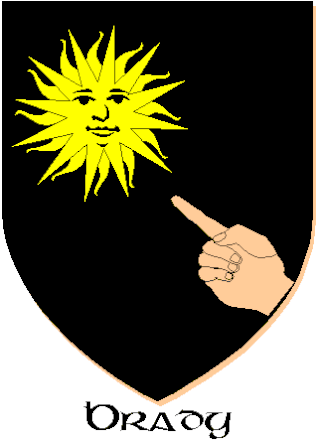Related Research Articles
Gordon is a surname with multiple origins, especially Scottish. The masculine given name Gordon is derived from the surname.
Doyle is a surname of Irish origin. The name is a back-formation from O'Doyle, which is an Anglicisation of the Irish Ó Dubhghaill, meaning "descendant of Dubhghall". There is another possible etymology: the Anglo-Norman surname D'Oyley with agglutination of the French article de. It means 'from Ouilly', the name of a knight who originated from one of the places named Ouilly in Normandy, such as Ouilly-le-Tesson, Ouilly-le-Vicomte, etc. The relationship with the family D'Oyly is unknown.
Holmes is an English-language surname with several origins.

Brady is a surname derived from the Irish surname Ó Brádaigh or Mac Brádaigh, meaning "spirited; broad".
The surname Ray has several origins.
Todd is a surname meaning "fox". It is an English and Scottish surname, but probably originated in Scotland for someone thought to resemble a fox in personality or perhaps more obviously in having red hair. This name was brought to Ulster, Ireland. It may refer to:
Melville is a surname and a given name.
The surname Collins has a variety of likely origins in Britain and Ireland:
- English and Scottish: A patronymic surname based on the English and Scottish name Colin, an English diminutive form of Nicholas.
- Norse: From the Old Norse personal name "Kollungr", a form of "koli" which in Old English became 'Cola', meaning swarthy or dark.
- Irish: The medieval surname was Ua Cuiléin, which has usually become Ó Coileáin today.
- Welsh: Collen; "hazel, hazel grove".
Bell is a surname common in English speaking countries with several word-origins.
James is a surname in the French language, and in the English language originating from the given name, itself derived from Old French James, variant form of Jacme, Jame, from Late Latin Jacomus, variant form of Latin Jacobus, itself from Hebrew Yaʿaqōḇ. Notable people with the surname include:
Crane is a surname. The name is a derivative of "Cron" in Old English or is the English translation of the German "Krahn" or "Kranich." According to The Oxford Dictionary of Family Names in Britain & Ireland, "Cron," "Krahn" and "Kranich" all mean "crown" in both Old English and German respectively. According to the same source, "Crone" is also compared with "Crane", "Crown", "Cron" and "Crowne". In some places in Britain, "Crane", when used as a name, can also be a reference to a tall, slender man, similar to the bird, "Crane" or to someone with long legs. Both the modern English version of "Crane" and modern German versions of "Krahn" or "Kranich" are more commonly associated with the tall bird than with a crown and the Old English and Old German translations have become less common.
Hubbard is an English surname. The name is a variant of the surnames Hobart, Hubbert, and Hubert. These surnames are derived from personal names, such as the Old German Hugibert and Hubert, which are composed of the elements hug and berht. Early forms of the surname include filius Huberti, Hubert, Huberd and Hubert, and Hoberd.
Sharp is an English language surname, cognate to the German scharf. It is also akin to words which have the sense of scraping, e.g. Latin scrobis 'ditch', Russian skresti 'to scrape'.
Armstrong is a surname of English and Scottish borders origin.
Hunt is an occupational surname related with hunting, originating in England and Ireland. In Estonia, the surname Hunt is also very common, meaning wolf in the Estonian language.
Russell, also Rosel, Rousel, Roussel, Russel or Rossell. The origin of the name has historically been subject to disagreement, with two distinct origins proposed. Early genealogists traced the Russel/Russell family of Kingston Russel from Anglo-Norman landholders bearing the toponymic surname 'de Rosel' or 'du Rozel', deriving from Rosel, Calvados, Normandy. However, J. Horace Round observed that these flawed pedigrees erroneously linked toponymic-bearing men with unrelated men who instead bore the Anglo-Norman nickname rus[s]el, given to men with red hair. This nickname was a diminutive of the Norman-French rus, meaning 'red', and was also an archaic name for the red fox, which in turn borrowed from Old Norse rossel, "red-haired", from Old Norse ros "red hair color" and the suffix -el. Round concluded "there is no reason to suppose that the surname Russell was territorial at all," and surname dictionaries have preferred to derive the surname from the nickname. Dictionaries also state that the English name Rufus originally meant "red haired".

Fox is a surname originating in England and Ireland. Variants include Foxe and Foxx.
Casey is a common variation of the Irish Gaelic Cathasaigh/Cathaiseach, meaning vigilant or watchful. At least six different septs used this name, primarily in the counties of Cork and Dublin.
Clarke is a surname which means "clerk". The surname is of English and Irish origin and comes from the Latin clericus. Variants include Clerk and Clark. Clarke is also uncommonly chosen as a given name.
Larkin is a surname of Russian, English and Irish origin. In England, the name is a relationship name from Lar, a pet form of the personal name Laurence. In Ireland, the name means a descendant of Lorcain or Lorcan, originally found in the form O'Lorcain.
References
- ↑ Hanks, P; Coates, R; McClure, P, eds. (2016). The Oxford Dictionary of Family Names in Britain and Ireland. Vol. 3. Oxford: Oxford University Press. p. 1965. ISBN 978-0-19-879883-5.
- ↑ Hanks, P; Coates, R; McClure, P, eds. (2016). The Oxford Dictionary of Family Names in Britain and Ireland. Vol. 3. Oxford: Oxford University Press. pp. 1965, 1975. ISBN 978-0-19-879883-5.